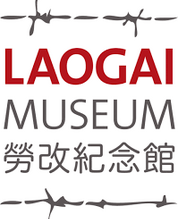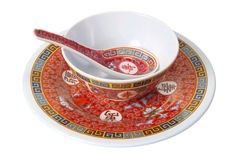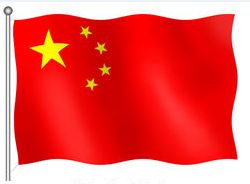-
The layout of the table
In China, the layout of the table is very different than in France because the utensils used are not the same. First, according to custom, round tables are the most practical and the most popular because everyone is at equal distance from the middle of the table where are put all the dishes.
Then, the differences keep going with the flatware which is far away from our usual cutlery. In fact we can find in a Chinese table the famous Chinese chopsticks, a small plate, a bowl and a spoon. The chopsticks are made of bamboo or reusable plastic and they have their rules. First we must never planted his chopsticks in a dish because it reminds the ink sticks used for funeral rites, then break a pair of chopsticks in the house of a host can be understood as a death threat, rub a pair of chopsticks before starting a meal is a sign of politeness meaning the pleasant prospect of a meal with friends and finally cross a pair of chopsticks on the plate is a sign of death, chopsticks should be laid in parallel.
All these beliefs around the chopsticks are very interesting because they show that the Chinese are always sensitive and attentive to their customs and that they perpetuate some traditional beliefs.
Another difference is that generally there not glasses on the table because the Chinese are not used to drink while they are eating. It also happens that the traditional paper napkins are replaced by scented hot towels.
The seating plan
In China, the guests are placed according to their "honour", defined either by age or by social status. The place of honour is located in front of the entrance door of the dining room and if possible, facing south. The place near the entrance door or located facing north are the less important and generally reserved for host (master house). Tradition wants that women are being separated from men by each occupying a different side of the table. Finally with a square or rectangular table, if there are only two persons, they must be on two consecutive sides of the table.
The service / The course of the meal
The service and the course of the meal in China is different than France because we do not eat in the same way. Indeed, the Chinese do not eat individually in their plate as in the West, all the dishes are brought on the middle of the table and everyone help one self directly into a small plate what he wants. Thus, everyone can create the blend of flavours that he wants. Normally there should be at the middle of the table as many dishes as there are guests.
I think this way of eating creates a friendlier atmosphere during the meal because the host does not have to get up constantly to serve everyone.
The rhythm of the meal in China is given by the guest of honour. No one should eat before he starts eating. It is better that everyone takes small portions at a time and the host must ensure a good filling of the plates of its neighbours. Finally at the end of the meal it is not polite in China to finish his dish to show his host that we have eat enough and that we have enjoyed the cooking.
Behaviour during the meal
In China aspects of behaviour completely derived from those in western. This is the cultural difference that I noticed the most since I arrived in China and this is the one with which I have the most trouble. Indeed, it is common to see Chinese people eating with their fingers, eating their noodles with a lot of noise their head into their plate, spitting cartilage on the table or even burping at the end of their meal. In France, if someone would do such things, he would be considered very rude and nasty. In China it is definitely not dirty and that's normal. This cultural difference is so big that it can dampen a lot of people who do not have an open-minded. The Chinese are often categorized as “dirty in table” by the Westerns because they are doing the opposite of what has been educated us in France.
At the end of the meal in a restaurant in China, there is no discussion of dividing the bill because it is considered like socially unacceptable.
Share the bill for the Chinese is considered as a sign of avarice. I think this comes from the way the food is eaten. In China everybody share the dishes, whereas in France everybody chosen individually its dish for which he pay.
In China the true honour is to pay for its friends, so the fight is big and it is often common to see a scene of dispute to know which one of the guests is going to pay. Even if you are not the richest, it is customary to offer to pay the bill. This tradition in China has a lot to do with the concept of “face”, that means that the Chinese like to be socially recognized and valued as a person. I love this cultural aspect of Chinese, because I think it shows their huge generosity.
In China It is also customary that the guests reorganize other diners for pay the bill in their turn.
 votre commentaire
votre commentaire
-
To fully integrate myself in my new country, I thought this was important that I find out about the geopolitical situation of China. My first article in this topics is about the geographical localisation of China and the government political orientation.
About its geographical localisation
The People’s Republic of China (PRC) is an East Asia state, delimited by 15,000 km of land borders , shared with 14 countries : Russia , North Korea , Mongolia , Vietnam , Laos , Burma , India , Bhutan, Nepal, Pakistan, Afghanistan , Tajikistan , Kyrgyzstan and Kazakhstan. China also has a sea area of 14 500 km.
China is the third country in the world by area (after Russia and Canada) and the first by its population. The total area of the country is about 9.5 million square kilometers, which is the equivalent of Europe.
About government political orientation in China
The advent of the People's Republic of China in 1949 brought a profound change in the country's institutions. Since then, China has developed four Constitutions. The first, led by Mao Zedong in 1954, was modelled on the USSR Constitution of 1936 was the most Stalinist and the most totalitarian. Mao Zedong imposed the communist collectivism and the unique-party system dictatorship. Two other constitutions succeeded it in 1975 and 1978. In 1982 a new constitution was accepted, more consistent with the new directions of the regime. Nevertheless, the People's Republic of China is defined as "a Socialist State of people's democratic dictatorship led by the working class and based on the alliance of workers and peasants". This corresponds to a centralized unitary state completely managed by the Chinese Communist Party.
Nowadays, the political system in China is based on local structures. Indeed, there are in the whole country 22 provinces, 5 autonomous regions (self-governing regions), 30 autonomous prefectures (sort of departments) and 124 autonomous districts. Each member of these structures are elected by the population. The provinces, autonomous regions and prefectures have the right to decide on important cases and to make regulations. Generally, autonomous regions are dealing with their internal affairs. Despite these local structures, Beijing's control is real. Indeed, each structure has a correspondent responsible to liaise with Beijing Government.
Moreover, a control is often kept on the population through the control of information, propaganda, censorship and threats of repression.
The main current leaders.
Xi Jinping, who since March 14, 2013, held the position of President of the People's Republic of China, Chairman of the Central Military Commission and General Secretary of the Communist Party in China.
Li Keqiang: Prime Minister of the State Council of the People's Republic of China
Zhang Dejiang: Chairman of the Standing Committee of the National People's Congress
Yu Zhengsheng: Chairman of the Chinese People's Political Consultative Conference
 votre commentaire
votre commentaire
-
Harry Wu, the Former political prisoner and survivor of Chinese labor camps died on 26 April at the age of 79.
Born in Shanghai, Harry Wu was just a student when he was sentenced to life imprisonment at the age of 23 years and jailed on April 27, 1960 in forced labour prison camp of Laogai after he criticised the Soviet Union which were at that time an ally of China. The Laogai were the forced-labour camps in China. The term comes from the Chinese words lao, meaning labour and gai, meaning reform, hence the term “reform through labour”
Mr Wu spent 19 years inside 12 different camps, an experience he said “turned him into an animal, fighting over scraps of food so he would not starve like millions of others”. In 2011 Mr Wu confessed to the BBC that he intended to commit suicide twice, because he felt that death was better than life.
Following political upheavals consecutive at the death of Mao Zedong in 1976, he was released in 1979 after 19 years of imprisonment. After his release, he went to the United States to work in geology, but quickly turned into a human rights campaigner. That is why in 1991, he decided to return in China to film clandestinely the forced labour camp reality of the Chinese communist regime.
After this travel he founded in 1992 The Laogai Research Foundation in Washington DC. The foundation has for purpose to expose human rights violations in China’s prison system. He also successfully campaigned to introduce the term Laogai in the Oxford English Dictionary.
In 1994, Harry Wu was naturalized American. One year later he took the risk again to return in China, but this time, he was arrested at the Chinese border and he was kept in detention for 66 days and sentenced for spying to 15 years of imprisonment. He was finally expulse from China under the American pressure.
 In November 2008, he inaugurated the Laogai museum at Washington. The museum explain the history and the structure of the Chinese prison system with pictures, officials papers and old prisoner uniforms from the personal archives of Harry Wu or from donations of former prisoners. This museum aims to commemorate the memory of thousands of victims of these camps and educate the public on the atrocities committed by the Chinese communist regime.
In November 2008, he inaugurated the Laogai museum at Washington. The museum explain the history and the structure of the Chinese prison system with pictures, officials papers and old prisoner uniforms from the personal archives of Harry Wu or from donations of former prisoners. This museum aims to commemorate the memory of thousands of victims of these camps and educate the public on the atrocities committed by the Chinese communist regime.
 votre commentaire
votre commentaire Suivre le flux RSS des articles
Suivre le flux RSS des articles Suivre le flux RSS des commentaires
Suivre le flux RSS des commentaires











